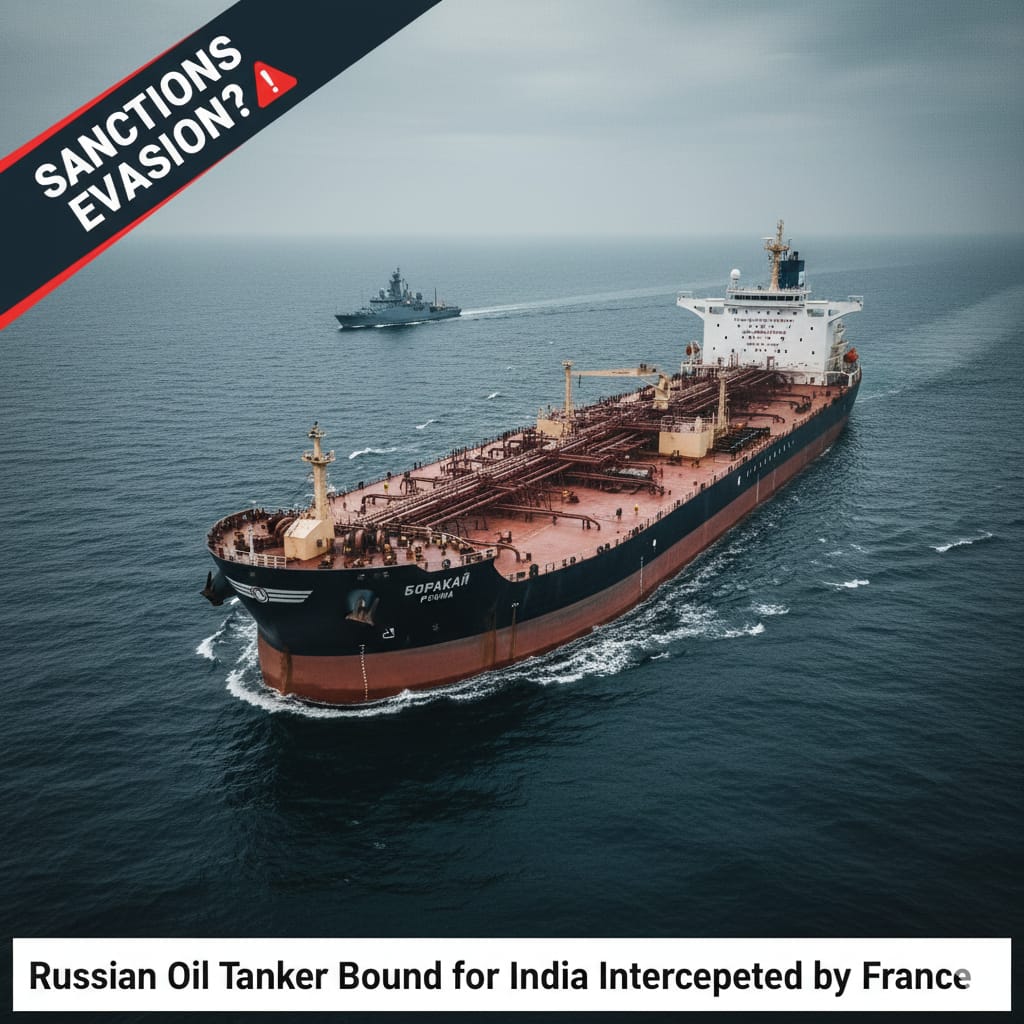
France has seized a Russian oil tanker off the Atlantic coast that was on its way to India, triggering a fresh diplomatic storm. The tanker was carrying a large shipment of oil and reportedly sailing under a fraudulent flag. French authorities acted after claims that the vessel was part of Moscow’s shadow fleet designed to evade Western sanctions and continue exporting oil around the world.
French President Emmanuel Macron confirmed the move, describing it as a step to dismantle the fleet that funds Russia’s war in Ukraine. Macron urged European countries to tighten pressure on what is often referred to as Russia’s ghost fleet, estimated to be 600 to 1,000 ships. He highlighted that 30 to 40 percent of Russia’s war effort in Ukraine is financed through the revenue from these vessels, with earnings reaching as high as 30 billion euros.
Macron’s Call for Stronger Action
Addressing European leaders in Copenhagen, Macron said that detaining and inspecting shadow tankers is critical. He argued that choking Russia’s oil trade is essential to limiting its war capacity. “You kill the business model by detaining, even for only a few weeks, vessels and forcing those financing them to organize differently,” he said.
According to him, intercepting these ships is not just symbolic but a measure with real economic impact. A single tanker is worth over 30 million euros, and its temporary detention can significantly disrupt Russia’s oil logistics. Macron urged fellow European nations to stand firm and coordinate closely to ensure that Moscow’s revenue streams are curtailed.
The Tanker Boracay and Its Shadow Role
The vessel seized by French authorities is known as Boracay or Pushpa. It had been operating under different names and registries over time, which investigators see as a clear tactic to avoid detection. The ship had sailed from Primorsk near St Petersburg in September, passing through the Baltic Sea and the Danish straits before entering the Atlantic.
French naval forces intercepted the tanker near the French port of Saint-Nazaire. Officials revealed that the crew failed to provide authentic documents of nationality. Both the captain and chief mate have been detained and are expected to go on trial in February. Authorities described the detention as a result of the vessel’s refusal to cooperate and its failure to justify its flag.
Russia’s Response and Growing Tensions
The Kremlin reacted strongly, claiming it had no information about the specific ship but condemned what it called provocative actions by European states. Russian officials maintain that Western governments are deliberately targeting Moscow’s trade routes to cripple its economy.
Meanwhile, President Vladimir Putin issued a fresh warning to Ukraine, threatening to strike nuclear plants in retaliation for alleged Ukrainian attacks. He accused Kyiv of attempting strikes on the occupied Zaporizhzhia plant and signaled that Russia could respond in kind.
Strategic Implications for India
The tanker was on its way to India, which has emerged as one of the largest buyers of Russian crude since Western sanctions were introduced. India has maintained that its energy imports are guided by national interest and energy security. The seizure of Boracay underscores the increasing risk surrounding Russian shipments and could complicate future trade flows.
Analysts note that India may have to adapt quickly to avoid disruptions, possibly diversifying sourcing routes or relying on different intermediaries. The move also highlights how European enforcement of sanctions is extending beyond its borders, impacting global oil markets.
Global Energy and Security Crossroads
France’s decision to seize the tanker illustrates how the Ukraine war has created ripple effects far beyond the battlefield. Oil flows that once traveled quietly across seas are now at the heart of geopolitical confrontations. The Western push to dismantle Russia’s shadow fleet is not only a financial blow to Moscow but also a reshaping of global trade dynamics.
For India, this incident is a reminder of the fragile balance between maintaining economic interests and navigating the complexities of global politics. For Europe, it is a test of unity and enforcement. And for Russia, it is another sign that its ability to bypass sanctions may face greater hurdles in the months ahead.





















